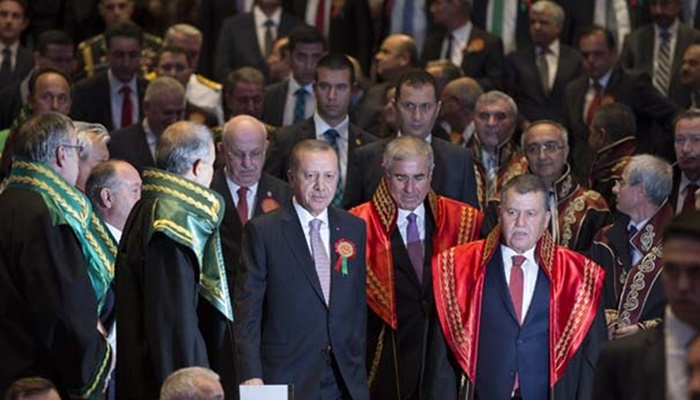Several executives from European-based judges’ associations in a series of interviews with the Arrested Lawyers Initiative slammed the political control over Turkey’s judiciary as well as the position taken by the European Court of Human Rights (ECtHR) vis-à-vis the deteriorating situation in the country in recent years.
Filipe Marques, president of the Magistrats Européens pour la Démocratie et les Libertés (MEDEL), said, “The human rights situation in Turkey is appalling: a judiciary under control of the executive, prisoners in solitary confinement for years without basic rights, mass dismissals and arrests with absolutely no guarantees.”
José Igreja Matos, president of the European Association of Judges, also condemned the treatment of legal professionals in Turkey.
“The suffering of our Turkish colleagues since 2016 has been horrific and remains to this very day unspeakably painful for all of us; following the detention of several thousands of judges and prosecutors, including that of Murat Arslan, president of the now-shuttered Association for the Union of Judges and Prosecutors (YARSAV),” Matos said.
Massive post-coup purge against members of the judiciary
Turkey disbarred more than 4,000 judges and prosecutors immediately after an abortive military coup in July 2016 over alleged ties to the faith-based Gülen movement, which it accused of orchestrating the attempted putsch. The movement denies any involvement.
The mass disbarment of members of the judiciary is believed by many to have had a chilling effect on the entire justice system, intimidating the remaining judges and prosecutors into doing the government’s bidding by launching politically motivated investigations into critics.
Top European rights court accused of failure to act
The ECtHR, the top European human rights reviewing body, has also been criticized for its failure to address the situation in Turkey. The ECtHR has dismissed individual applications of those summarily removed from public service by emergency decree-laws, asking applicants to first exhaust domestic remedies.
The court has also failed to deliver judgments on some of the applications, such as that of journalist and author Ahmet Altan, who since 2016 has been imprisoned on account of his writings. Altan’s case, to which the ECtHR had granted priority status, has been pending before the court since January 2017.
The ECtHR has also deemed inadmissible requests for interim measures filed by former Turkish judges and prosecutors who are kept in solitary confinement.
“Since the beginning of the situation in Turkey, MEDEL and other institutions have addressed the ECtHR, asking for interim measures, as it was clearly evident for us that the lack of independence of the judiciary in Turkey meant that there was an emergency situation and that there was no possibility of domestic remedy,” Marques said. “The ECtHR, however, has systematically refused to adopt interim measures.”
The European judges also argued that the ECtHR’s stance on Turkey will significantly affect its legacy.
“Four years later, we are still waiting for decisions from the ECtHR. I think the ECtHR must face this issue seriously and look at it as a matter of its own credibility – the reputation it has built during the years, of the main guardian of human rights in Europe,” Marques said.
Manuel Soares, president of the Union Association of the Portuguese Judges (ASJP), said: “The ECtHR cannot turn a blind eye to glaring illegalities. If it does so, it will be denying its role, betraying the trust it has built up over the years and condemning itself to disbelief and irrelevance.”
“The ECtHR existed before Turkey’s current dictatorial power and will endure after its end. Crises are transitory, but what is right must be permanent and stable,” Soares said.
Should Turkey’s Constitutional Court be seen as a means of domestic remedy?
President of the Association of European Administrative Judges Edith Zeller and Matos of the European Association of Judges said they believe the ECtHR should stop considering Turkey’s Constitutional Court as a means of effective domestic remedy.
“In the actual situation, there is no independent judiciary in Turkey, and there is no effective domestic remedy,” Zeller said.
“The actions of the Turkish Constitutional Court over the last years eloquently speaks for itself,” Matos said.
Tamara Trotman, president of Judges for Judges, elaborated on the Constitutional Court’s role.
“When we look at the way the Turkish Constitutional Court handled the case of judge Yıldırım Turan, completely disregarding the ECtHR decision in the case of judge Hakan Baş and see the inaction of the court regarding the ongoing detention in the case of human rights defender Osman Kavala, despite the fact that the ECtHR called on the government of Turkey to take measures to secure his immediate release, I assume the tipping point is within sight,” Trotman said.
Back in July, Turkey’s Constitutional Court delivered a judgment on the case of imprisoned former judge Turan in which it defied a previous ECtHR ruling that found judge Hakan Baş’s pre-trial detention to be in violation of the European Convention on Human Rights.
The Constitutional Court verdict described the ECtHR’s divergence from Turkish courts in interpreting domestic law as “unacceptable” and argued that Turkish courts were “much better positioned than the ECtHR for explaining and interpreting the provisions of Turkish law.”
“I am afraid we are lulling ourselves to sleep if one still thinks the Turkish Constitutional Court can be an effective agent of change under the present conditions,” Trotman said.



